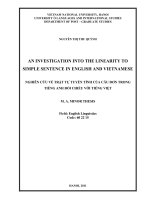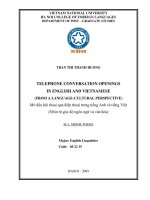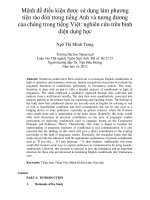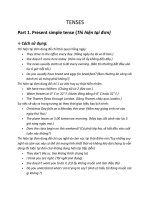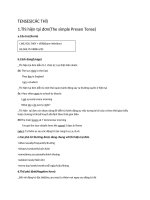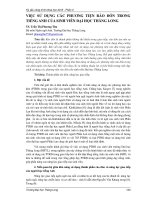Thì quá khứ đơn trong tiếng Anh
Bạn đang xem bản rút gọn của tài liệu. Xem và tải ngay bản đầy đủ của tài liệu tại đây (83.76 KB, 20 trang )
QUÁ KHỨ ĐƠN
Past simple
I. Khái niệm thì quá khứ đơn
Thì quá khứ đơn (Past simple) dùng để diễn tả hành động sự vật đã xảy ra trong quá khứ
hoặc vừa mới kết thúc.
Ví dụ:
We went shopping yesterday. (Ngày hơm qua chúng tôi đã đi mua sắm)
He didn’t come to school last week. (Tuần trước cậu ta không đến trường.)
II. Công thức thì q khứ đơn
Thể
Động từ tobe
Động từ thường
Cơng thức: S + was/ were +
O
Công thức: S + V-ed/ VQK
(bất quy tắc) + O
S = I/ He/ She/ It (số ít) +
was
Khi chia động từ có quy tắc
ở thì q khứ, ta chỉ cần
thêm hậu tố "-ed" vào cuối
động từ
S= We/ You/ They (số
nhiều) + were
Khẳng định
Ví dụ 1: My computer was
broken yesterday. (máy tính
của tơi đã bị hỏng hơm qua)
Có một số động từ khi sử
dụng ở thì q khứ không
theo qui tắc thêm “-ed”.
Những động từ này ta cần
học thuộc.
Ví dụ 2: They were in Paris
on their summer holiday
Ví dụ 1: She watched this
last year. (Họ ở Paris vào kỳ film yesterday. (Cơ ấy đã
nghỉ hè năm ngối.)
xem bộ phim này hơm qua.)
Ví dụ 2: I went to sleep at
11p.m last night. (Tôi đi
ngủ 11 tối qua)
Phủ định
S + was/were not +
Object/Adj
S + did not + V (nguyên
thể)
Đối với câu phủ định ta chỉ
cần thêm “not” vào sau
động từ “to be”.
Trong thì quá khứ đơn câu
phủ định ta mượn trợ động
từ “did + not” (viết tắt là
“didn’t), động từ theo sau ở
dạng nguyên thể.)
CHÚ Ý:
– was not = wasn’t
– were not = weren’t
Ví dụ:
– She wasn’t very happy
last night because of having
lost money. (Tối qua cô ấy
khơng vui vì mất tiền)
-We weren’t at home
yesterday. (Hơm qua chúng
tơi khơng ở nhà.)
Nghi vấn
Ví dụ 1: He didn’t play
football last Sunday. (Anh
ấy đã khơng chơi bóng đá
vào chủ nhật tuần trước.)
Ví dụ 1: We didn’t see him
at the cinema last night.
(Chúng tôi không trông thấy
anh ta tại rạp chiếu phim tối
hôm qua.)
Câu hỏi: Was/Were+ S +
Object/Adj?
Câu hỏi: Did + S +
V(nguyên thể)?
Trả lời: Yes, I/ he/ she/ it +
was.
– No, I/ he/ she/ it + wasn’t
Yes, we/ you/ they + were.
– No, we/ you/ they +
weren’t.
Trong thì quá khứ đơn với
câu hỏi ta mượn trợ động từ
“did” đảo lên trước chủ
ngữ, động từ theo sau ở
dạng nguyên thể.
Câu hỏi ta chỉ cần đảo động
từ “to be” lên trước chủ
ngữ.
Ví dụ 1: Did you visit Ha
Noi Museum with your
class last weekend? (Bạn có
đi thăm bảo tàng Hà Nội với
lớp của bạn cuối tuần trước
hay khơng?)
Ví dụ 1: Was she tired of
hearing her customer’s
complaint yesterday? (Cơ
ấy có bị mệt vì nghe khách
hàng phàn nàn ngày hôm
qua không?)
Yes, I did./ No, I didn’t.
(Có, mình có./ Khơng, mình
khơng.)
Yes, she was./ No, she
wasn’t. (Có, cơ ấy có./
Khơng, cơ ấy khơng.)
Ví dụ 2: Were they at work
yesterday? (Hơm qua họ có
làm việc khơng?)
Ví dụ 2: Did she miss the
train yesterday? (Cơ ta có lỡ
chuyến tàu ngày hơm qua
hay khơng?)
Yes, She did./ No, She
didn’t. (Có, cậu ta có./
Khơng, cậu ta khơng.)
Yes, they were./ No, they
weren’t. (Có, họ có./
Khơng, họ khơng.)
III. Cách chia động từ ở thì quá khứ
Ta thêm “-ed” vào sau động từ:
-
Thông thường ta thêm “ed” vào sau động từ.
Ví du: watch – watched / turn – turned/ want – wanted/ attach – attached/
-
Động từ tận cùng là “e” -> ta chỉ cần cộng thêm “d”.
Ví dụ: type – typed/ smile – smiled/ agree – agreed
-
Động từ có MỘT âm tiết, tận cùng là MỘT phụ âm, trước phụ âm là MỘT nguyên
âm -> ta nhân đôi phụ âm cuối rồi thêm “-ed”.
Ví dụ : stop – stopped/ shop – shopped/ tap – tapped /
-
Ngoại lệ một số từ khơng áp dụng quy tắc đó: commit – committed/ travel –
travelled/ prefer – preferred
Động từ tận cùng là “y”:
+ Nếu trước “y” là MỘT nguyên âm (a,e,i,o,u) ta cộng thêm “ed”.
Ví dụ: play – played/ stay – stayed
+ Nếu trước “y” là phụ âm (còn lại ) ta đổi “y” thành “i + ed”.
Ví dụ: study – studied/ cry – cried
•
Cách phát âm "-ed":
+ Đọc là /id/: khi tận cùng của động từ là /t/, /d/
+ Đọc là /t/: khi tận cùng của động từ là /ch/, /s/, /x/, /sh/, /k/, /f/, /p/
+ Đọc là /d/: khi tận cùng của động từ là các phụ âm và nguyên âm còn lại
Một số động từ bất qui tắc khơng thêm “ed”.
Có một số động từ khi sử dụng ở thì q khứ khơng theo qui tắc thêm “ed”. Những
động từ này ta cần tự học thuộc chứ không có một qui tắc chuyển đổi nào. Dưới đây
một số động từ bất quy tắc
IV. Cách sử dụng thì quá khứ đơn :
Cách dùng
Ví dụ
1. Diễn đạt một hành động xảy ra một,
Ví dụ 1: He visited his parents every
một vài lần hoặc chưa bao giờ xảy ra weekend. (Anh ấy đến thăm ba mẹ anh ấy
trong quá khứ
vào cuối tuần)
Ví dụ 2: She went home every Friday. (Cơ
ấy thường về nhà vào mỗi thứ 6)
2. Diễn đạt các hành động xảy ra liên
tiếp trong quá khứ
3. Diễn đạt một hành động xen vào
một hành động đang diễn ra trong
quá khứ
Ví dụ 1: She came home, switched on the
computer and checked her e-mails. (Cô ấy
đã về nhà và bật máy tính và kiểm tra
email.)
Ví dụ 2: She turned on her computer, read
the message on Facebook and answered it.
(Cô ấy đã mở máy tính, đọc tin nhắn
facebook và trả lời tin nhắn)
Ví dụ 1: When I was having breakfast, the
phone suddenly rang. (Khi tôi đi ăn sáng và
điện thoại đột nhiên reo lên)
Ví dụ 2: When I was cooking, my parents
came. (Khi tôi đang nấu ăn, ba mẹ tôi đến)
4. Dùng trong câu điều kiện loại II
Ví dụ 1: If I had a million USD, I would
buy that car. (Nếu tơi có 1 triệu đơ, tơi sẽ
mua ơ tơ)
Ví dụ 2: If I were you, I would do it. (Nếu
tơi là bạn, tơi sẽ làm việc đó)
V. Dấu hiệu nhận biết thì q khứ đơn
•
•
•
•
•
Trong câu có các từ như: yesterday, ago, last (week, year, month), in the past, the
day before, với những khoảng thời gian đã qua trong ngày (today, this morning,
this afternoon).
When I was a child,… (khi tơi cịn nhỏ)
When I was young,… (khi tơi cịn trẻ)
Sau as if, as though (như thể là), it’s time (đã đến lúc), if only, wish (ước gì),
would sooner/ rather (thích hơn)
When S + Ved , S + Ved
+ Ví dụ 1: Yesterday morning, Tom got up early; then he ate breakfast and wen t to
school. (Sáng hôm qua, Tom dậy trễ, sau đó cậu ấy ăn sáng và đến trường)
+ Ví dụ 2: Tom lived in Viet Nam for six years, now he lives in Paris (Tom sống ở
Việt Nam trong khoảng 6 năm, giờ cậu sống ở Paris)
+ Ví dụ 3: The plane took off two hours ago. (Máy bay đã cất cánh cách đây 2 giờ.)
VI. Luyện tập quá khứ đơn
Bài 1: Hoàn thành các câu bằng cách sử dụng các động từ sau ở dạng chính xác (
động từ bất quy tắc )
(buy – catch - cost - fall - hurt - sell - spend – teach - throw -·write)
1. Mozart …wrote….. more than 600 pieces of music.
2 'How did you learn to drive?' 'My father . ................. me.'
3 We couldn't afford to keep our car, so we …………… .. it.
4 Dave ....................................... down the stairs this morning
and ... . ............ ................ his leg.
5 joe ....................................... the ball to Sue, who .. ..... .. .. .. .. ............... it.
6 Ann .......... ..... a lot of money yesterday. She . ... ........... a dress which ........... ..... ..
..... £100.
Bài 2: Hoàn thành các câu. Đặt động từ vào đúng dạng.
1. lt was warm, so I ………. off my coat. (take)
2. The film wasn't very good. I .……….. it much. (enjoy)
3. I knew Sarah was busy, so I ........................ ....................... her. (disturb)
4. We were very tired, so we . ...................... ............... the party early. (leave)
5. The bed was very uncomfortable. I .................................................. well. (sleep)
6. The window was open and a bird .................. ........... ..... . into the room. (fly)
7. The hotel wasn't very expensive. lt .. ..... .... . ............. much to stay there. (cost)
8. I was in a hurry, so I..... .... ... .. ......... time to phone you. (have)
9 lt was hard carrying the bags. They ................................ .. ................ very heavy.
(be)
Bài 3: Chọn đáp án đúng
1. They __________ the bus yesterday.
A. don’t catch
B. weren’t catch
C. didn’t catch
D. not catch
2. My sister __________ home late last night.
A. comes
B. come
C. came
D. was come
3. My father __________ tired when I __________ home.
A. was – got
B. is – get
C. was – getted
4. What __________ you __________ two days ago?
D. were – got
A. do – do
B. did – did
C. do – did
D. did – do
5. Where __________ your family __________ on the summer holiday last year?
A. do – go
B. does – go
C. did – go
D. did – went
Bài 4: Bạn có cuộc nói chuyện với James về kỳ nghỉ của anh ấy. Viết câu hỏi của
bạn để hoàn thành đoạn hội thoại dưới đây nhé:
Hi. How are things?
Fine, thanks. I've just had a great holiday.
1. Where ….did you ... go... ?
To the U.S. We went on a trip from San Francisco to Denver.
2. How ............... .............................. . ? By car?
Yes, we hired a car in San Francisco.
3. lt's a long way to drive. How long. ........................ to get to Denver?
Two weeks.
4. Where ………………. ? In hotels?
Yes, small hotels or motels.
5. ………………………. good?
Yes, but it was very hot - sometimes too hot
6……………..... the Grand Canyon ?
Of course. lt was wonderfull.
Bài 5: Hoàn thành đoạn hội thoại sau:
Claire: (Did you have (you / have) a nice weekend in Paris?
Mark: Yes, thanks. It was good. We looked around and then we saw a show.
(1) ..................................... (we / not / try) to do too much.
Claire: What sights (2) ........................................... (you / see)?
Mark: We had a look round the Louvre. (3)……………………………. (I / not /
know) there was so much in there.
Claire: And what show (4)............................................... (you / go) to?
Mark: Oh, a musical. I forget the name. (5) ..................... (I / not / like) it.
Claire: Oh, dear. And (6) .............................................. (Sarah / enjoy) it?
Mark: No, not really. But we enjoyed the weekend. Sarah did some shopping, too, but
(7) ........................... (I / not / want) to go shopping.
Bài 6: Hồn thành câu sau đúng dạng thì q khứ đơn:
1. It/ be/ cloudy/ yesterday._______________________________________________
2. In 1990/ we/ move/ to another city._______________________________________
3. When/ you/ get/ the first gift?___________________________________________
4. She/ not/ go/ to the church/ five days ago._________________________________
5. How/ be/ he/ yesterday?_______________________________________________
6. Mrs. James/ come back home/ and/ have/ lunch/ late/ last night?
_____________________________________________________________________
7. They/ happy/ last holiday?_____________________________________________
8. How/ you/ get there?__________________________________________________
9. I/ play/ football/ last/ Sunday.___________________________________________
10. My/ mother/ make/ two/ cake/ four/ day/ ago._____________________________
11. Tyler/ visit/ his/ grandmother/ last/ month.________________________________
12. Joni/ go/ zoo/ five/ day/ ago.___________________________________________
13. We/ have/ fun/ yesterday._____________________________________________
14. My/ father/ not/ at the office/ the day/ before yesterday.
_____________________________________________________________________
Bài 7: Chia động từ trong ngoặc đúng dạng thì quá khứ đơn:
Snow White was the daughter of a beautiful queen, who died when the girl (be) (1)
……….. young. Her father (get married) (2) ………….again, but the girl’s
stepmother was very jealous of her because she was so beautiful. The evil queen
(order) (3)………….a hunter to kill Snow White but he couldn’t do it because she
was so lovely. He (chase) (4) ………….her away instead, and she (take) (5)
………….refuge with seven dwarfs in their house in the forest. She (live) (6)
………….with the dwarfs and took care of them and they (love) (7) ………….her
dearly. Then, one day the talking mirror (tell) (8) ………….the evil queen that Snow
White was still alive. She (change) (9) ………….herself into a witch and (make) (10)
………….a poisoned apple. She (go) (11) ………….to the dwarfs’ house disguised as
an old woman and tempted Snow White to eat the poisoned apple, which (put) (12)
………….her into an everlasting sleep. Finally, a prince (find) (13) ………….her in
the glass coffin where the dwarfs had put her and woke her up with a kiss. Snow
White and the prince (be) (14) ………….married and lived happily ever after.
Bài 8. Chuyển những động từ bất quy tắc sau sang dạng quá khứ:
1. Be
2. Become
3. Begin
4. Break
5. Bring
6. Build
7. Buy
8. Choose
9. Come
10. Cost
11. Cut
12. Do
13. Dream
14. Drink
15. Eat
Bài 9: Chia động từ trong ngoặc cho đúng
1. It was warm, so I took off my coat. (take).
2. The film wasn't very goor. I didn't enjoy it very much. (enjoy)
3. I knew Sarah was very busy, so I ..... her (disturb)
4. I was very tired, so I ..... the party early. (leave)
5. The bed was very uncomfortable. I ..... very well (sleep)
6. The window was open and a bird ..... into the room (fly)
7. The hotel wasn't very expensive. It ..... very much (cost)
8. I was in a hurry, so I ..... time to phone you (have).
9. It was hard carrying the bags. They ..... very heavy. (be)
Bài 10 : Hoàn thành đoạn văn sau
1. Yesterday, I (go)______ to the restaurant with a client.
2. We (drive) ______ around the parking lot for 20 mins to find a parking space.
3. When we (arrive) ______ at the restaurant, the place (be) ______ full.
4. The waitress (ask) ______ us if we (have) reservations.
5. I (say), "No, my secretary forgets to make them."
6. The waitress (tell)______ us to come back in two hours.
7. My client and I slowly (walk) ______ back to the car.
8. Then we (see) ______ a small grocery store.
9. We (stop) in the grocery store and (buy) ______ some sandwiches.
10. That (be) ______ better than waiting for two hours.
11. I (not go) ______ to school last Sunday.
12. She (get) ______ married last year?
13. What you (do) ______ last night? - I (do) ______ my homework.
14. I (love) ______ him but no more.
15. Yesterday, I (get) ______ up at 6 and (have) ______ breakfast at 6.30.
16. I _____ at home all weekend. ( stay)
17. Angela ______ to the cinema last night. (go)
18. My friends ______ a great time in Nha Trang last year. (have)
19. My vacation in Hue ______ wonderful. (be)
20. Last summer I _____ Ngoc Son Temple in Ha Noi. (visit)
21. My parents ____ very tired after the trip. ( be)
22. I _______ a lot of gifts for my little sister. (buy)
23. Lan and Mai _______ sharks, dolphins and turtles at Tri Nguyen aquarium.(see)
24. Trung _____ chicken and rice for dinner. (eat)
25. They ____ about their holiday in Hoi An. (talk)
26. Phuong _____ to Hanoi yesterday. (return)
27. We _____ the food was delicious.(think)
Bài 11 : Viết lại câu sau, chia động từ ở thì quá khứ đơn.
1. I/ go swimming/ yesterday.
=>__________________________________________________________________
2. Mrs. Nhung/ wash/ the dishes.
=>________________________________________________________________
3. my mother/ go shopping/ with/ friends/ in/ park.
=>__________________________________________________________________
4. Lan/ cook/ chicken noodles/ dinner.
=>__________________________________________________________________
5. Nam/ I/ study/ hard/ last weekend.
=>_________________________________________________________________
6. my father/ play/ golf/ yesterday.
=>_________________________________________________________________
7. last night/ Phong/listen/ music/ for two hours.
=>_________________________________________________________________
8. they/ have/ nice/ weekend.
=>_________________________________________________________________
9. she/ go/ supermarket yesterday.
=>_________________________________________________________________
10. We/ not go/ school last week.
=>_________________________________________________________________
Bài 12: Sử dụng từ trong ngoặc cho đúng thì và hãy trả lời những câu hỏi dưới:
Yesterday (be).......... Sunday, Nam (get)...............up at six. He (do) ........... his
morning exercises. He (take) ...............a shower, (comb).............. hair, and then he
(have) .............. breakfast with his parents. Nam (eat)............ a bowl of noodles and
(drink) a glass of milk for his breakfast. After breakfast, he (help) .............. Mom
clean the table. After that, he (brush).......... his teeth, (put).......... on clean clothes, and
(go)............ to his grandparents' house. He (have) .............. lunch with his
grandparents. He (return) to his house at three o'lock. He (do).............. his homework.
He (eat).......... dinner at 6. 30. After dinner, his parents (take).......... him to the movie
theater. It (be)...............a very interesting film. They (come) .............. back home at 9.
30. Nam (go)................... to bed at ten o'clock.
1. What day was yesterday? .................................................................................
2. What time did Nam get up? ..............................................................................
3. What did he do after breakfast? .........................................................................
4. Who did he have lunch with? ...........................................................................
5. What time did he have dinner? ..........................................................................
6. What time did Nam go to bed? ........................................................................
Bài 13: Chia động từ trong ngoặc :
When I (meet) Jane last year, she (be) a student.
They (get) married when they (be) in Chicago.
Teacher (recommend) that we always do our homework.
Who (write) the song ‘How can I live without you’?
She (have) a fight with her boyfriend last week.
He (study) Spanish when he was at University.
My father (forgot) his camera in the company yesterday.
The thieves (steal) the painting in 1998.
Last week, my uncle (drive) me to the school by his new car.
She (not/take) part in the contest three years ago.
They (order) something to drink.
Last summer, I (go) to Sturgatt with my family.
She (not/ do) her homework before going to class yesterday.
Our cat (catch) a big mouse this morning.
In 2001 our class (make) a trip to Norwich.
The secretary (delete) all important files yesterday.
Paul (look) at and (say) nothing to me.
The people (whisper) something to each other in our company.
The weather (be) really nice, so I (want) to go out with my love.
The car (not/ stop) at the traffic lights.
(you/have) a nice weeken in Twain?
She (become) a doctor five years ago.
Mozart (write) more than 600 pieces of music.
We (see) Rose in town a few days ago.
I (go) to cinema three times last week.
It (is) cold last night, so I (shut) the window.
I work in a travel agency now. Before that I (work) in a shop.
We (invite) them to our party but they (decide) not to come.
The police (stop) me on my way home last night.
She passed her examination because she studied very hard.
You (go) out last night? Yes, I (go) to the cinema but I (not/enjoy) the film much.
What you (do) at the weekend?
They (be/not) able to come because they (be) so busy.
(Be) the weather good when you (be) on holiday?
His parents (be) so angry because he (get) home late.
The weather (be) so cold that I (can not) sleep well last night.
A young couple (buy) the house next door. But they (not/live) there long.
I (see) a mad dog killed yesterday.
I (hear) that song (sing) on the radio two days ago.
They (sit) for two hours without taking to each other.
You (remember) to switch off the lights?
I (try) all keys in the lock, but none of them fitted.
There (be) many famous stars in the concert last night.
He (admit) not paying for the ticket.
(You/hear) the terrible noise last night ?
There (be) a bank robbery in central London yesterday.
He (get) a job as a truck driver.
I often (come) to see her every week.
My mother never (eat) raw fish.
They (set) up their company in 2000.
She (walk) straight past me without saying hello.
The swimming pool (close) all day yesterday.
Simon (buy) two tickets for the concert, so he can’t be going on his own.
He (give) me back the book and (thank) me for lending it to him.
The weather (be) terrible yesterday, so we (spend) day at home.
They (ask) all candidates in the room the same question.
All of them (enjoy) the play except Peter.
My mother (give) me a meaningful gift on my birthday last year.
He is very kind. He (show) me the way to the bus stop.
When I (be) a child, my family (be) very poor.
He (take) his girl friend by the hand and (kiss) her.
The Committee (force) Mr.Smith to resign.
The director (request) that I must be here on time.
There (be) two students absent yesterday.
Where (you/get) this skirt?
I (not/have) your name and address.
She was surprised that she (not/be) invited to the party.
My mother (have) got terrible headache, so we (take) to the hospital.
He (make) a diagram to show us the way to go.
The maid (do) everything that I (tell) her to do.
His joke (make) everyone laugh.
I (take) your bag instead of mine by mistake.
(You/pay) by cheque or in cash ?
I thinks that her attitude to you yesterday (be) rather unpleasant.
He (refuse) to give me an answer for my question.
I (put) my trust in you but now, I am completely disapointed.
She (get) married at age of 18.
We (receive) no notification prior to that date.
Last week, I (meet) the people I used to live with.
Tom promised to give Janet the answer by the end of the week.
The robbers (attack) the owner of the house and (disappear) with the expensive
painting.
My father (decide) to give up smoking last month.
Linda said that her family (organize) a trip round city.
The film (not/come) up to my expectations.
Tom (borrow) 14,000 dollars from the bank.
She (speak) slowly so that we (can) understand what she (say).
The teacher (tell) the boys to stop playing.
My father is angry with me. I (not/do) some work that I should have done last week.
She (move) to Da Lat to live in 1999.
He (raise) his hand after the teacher had finished her question.
John (worry) a great deal about examinations.
I (start) going to school at the age of five.
You (come) here by bus or by car ?
My wife (want) me to call at the butcher’s on my way home.
Last week, my neibours (argue) about where to go for their holidays.
She (waste) hours looking for the picture book .
Why (you/not/attend) the concert ?
He (devote) most of his time to write novels.
If you (kick) a policeman, you would be arrested.
My brother (travel) around Europe for the last two years.
She (explain) to me what the word (mean).
They (look) very cheerful when They (came) to see us last night.
She said she (not/derive) some joys from working.
There (be) great changes in our village in the past few years.
Peter’s father (die) of lung cancer last year.
He (refuse) to join us on the trip to the mountains.
He (jump) at the opportunity when the by-election (be) announced.
His coach (disapprove) his going out the evening before the competition.
We (warn) him of all the dangers he would meet if he settled in that country.
When I (be) a boy, we (have) no electricity in the village.
I (sleep) badly last night. The noise of the traffic (keep) me awake.
After climbing for six hours, we (manage) to reach the mountain top.
I (walk) home after the party last night.
Lan (watch) television a lot when she was ill last year.
Sarah (go) to thye party last week. Paul (go) to the party too; but they (not/see) each
other.
Suddenly, everybody stopped talking. There (be) silience.
It was late, so I (decide) take a taxi.
Simon (be) in a difficult situation, so I (agree) to lend him some money.
I can't believe I (get) got that apartment.
I (submit) my application last week, but I (not/think) I (have) a change of actually
getting it.
When I (show) up to take a look around, there (be) at least twenty other people who
had arrived before me.
When the boy (come) home, he (throw) the umbrella to the ground and (run) away as
fast as he could.
She (go) to town and (buy) a special gilf for her close friend’s birthday.
She (be) sorry that she (have to) leave the party early last night.
As soon as she (see) me, she (wave) and (shout) something.
The play (succeed) thanks to fine acting by all the cast.
She (blush) with embarrassment when she (meet) a handsome guy.
He (welcome) her with open arms.
She (employ) a secretary to help with her work.
The old man (die) of pneumonia.
He (walk) slowly because of his bad led.
He (shout) to me from across the room.
I (drop) the key somewhere about here.
He (sit) with arms across his chest.
They (find) the body burried beneath a pile of leaves.
The boat (sink) beneath the waves.
The accident (do) a lot of damage to the car.
His sense of humour (appeal) to the girls enormously.
She (gaze) at me in disbelief when I (tell) her the news.
I (dream) about my great grandfather last night.
I (wonder) at the speed with which it arrived.
She (blame) her parents for the failure of her marriage.
The car (go) out of control and (crash) into the back of a bus.
He (complain) about having to collect the children from school.
The doctor (show) the patient how to do some exercises.
She (regret) not to learn how to ride a bicycle when she was young.
Firemen (rescue) several people from the top floor of the blazing building.
He (fill) in the necessary forms and (apply) for the job.
The film (last) three hours with an interval of 15 minutes between part one and part
two.
I (oversleep) this morning and (be) late for school.
Bài 14. Chia các động từ sau ở thì quá khứ đơn.
1. I _____ at home last weekend. (stay)
2. Angela ______ to the cinema last night. (go)
3. I and my friends ______ a great time in Nha Trang last year. (have)
4. My vacation in Hue last summer ______ wonderful. (be)
5. Last June I _____ Ngoc Son Temple in Ha Noi. (visit)
6. My parents ____ very tired after the trip. (be)
7. I _______ a lot of gifts for my little sister. (buy)
8. Lan and Mai _______ sharks, dolphins and turtles at Tri Nguyen aquarium. (see)
9. Trung _____ chicken and rice for dinner. (eat)
10. They ____ about their holiday in Hoi An. (talk)
Bài 15. Chia động từ trong ngoặc
Last year my brother (spend) ___________ his holiday in Đà Lạt.
It (be) ___________ really great.
I (travel) ___________around by motorbike with three friends and we visited lots of
interesting places.
In the evening I usually (go) ___________to a bar.
One night she even (learn) ___________some Ailen dances.
They (be) ___________very lucky with the weather.
It (not / rain) ___________yesterday.
But we (see) ___________some beautiful rainbows.
Where (spend / Lan) ___________her last holiday?


